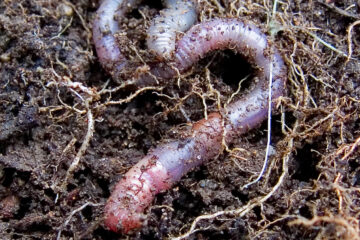Imagine John Kiefner as a special agent licensed to kill. What would my agent name be? Would the members of Spectre: Dr. No, Blofeld or Jaws and Goldfinger be in danger? Would I have to drink vodka martinis? That is enough fantasy for now; I am going to finish this article with a plethora of questions.
Did you know that an insect has 6 legs, 4 wings, 2 antennae and 3 body parts? Did you know that spiders and mites have 8 legs, 0 wings and antennae and only 2 body parts. Do you know the difference between a complete and incomplete life cycle? What is the definition of a pest? Do you think that scouting is the first and most important step before applying a pesticide? What is the difference between particle and vapor drift and how do you prevent both?
What is the difference between L, DF, WP, G, WDG, suspension or liquid? Do wet formulations use pounds of a.i. per gallon or a % by weight? What is a.i.? What determines the persistence of pesticide in the soil, its LD-50 or half-life? What is the most likely way for bees or humans to be contaminated with pesticide?
What are the 3 major sections of a pesticide label? Is the label the law, like a legal document you must follow? Since many pesticides are expensive, should you transport them inside your vehicle? What is FIFRA? What is the EPA and what are the two major classifications of pesticides. Did you know you must obtain a permit from the IDNR before using piscicides and avicides? Did you also know that starlings, house sparrows and feral pigeons are about the only birds not protected by conservation laws?
What is the difference between a private orcommercial pesticide applicator and commercial not for hire? Did you know farmers need to pass a test and obtain a license to use restricted-use pesticides and anybody who uses pesticides at a job also must pass at least one test to apply pesticides. Do you know these applicator categories: aquatic, demonstration and research, field crops, grain facility, mosquito, ornamental, plant management, right-of-way, seed treatment, turf, forest, fruit crop, livestock, sewer root, soil fumigation, vegetable crops? Is that enough questions?
Every 3 years, like many farmers, I have to take and pass my private pesticide applicators exam. Without it I would not be able to spray certain products on my farm. 6 years ago I decided to take the exam without any brushing up. Even though a passing grade is 70%, I was disappointed when I got an 86. With old age creeping up on me, I took no chances this year and signed up for continuing education.
Today I received my new pesticide license. This gives me free will to once again kill unwanted pests on my farm. The villains in the Bond films are safe. However, if you are waterhemp, marestail, foxtail, velvetleaf, spider mites, Japanese beetle, alfalfa weevil or a plethora of fungal diseases, look out. I am once again licensed to kill you. That is, of course, after I calculate the economic threshold and determine if it is better financially and environmentally to live with you… or kill you.



0 Comments